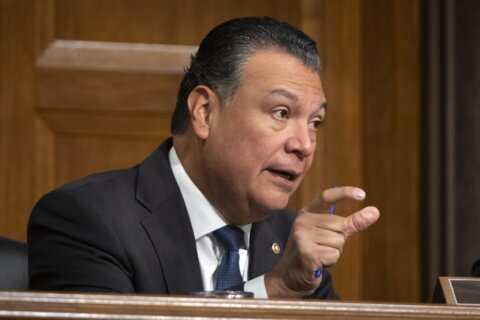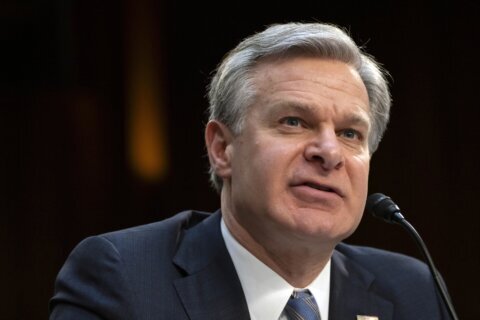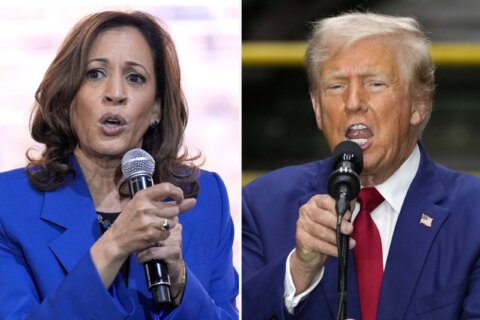WASHINGTON (AP) — Arizona is already expected to play a critical role in the White House race as it did in 2020, but Tuesday’s state primaries will set the stage for competitive contests that could determine control of the closely divided U.S. Senate, U.S. House and both chambers of the state legislature.
Topping the ballot Tuesday is the Republican primary in the race to replace U.S. Sen. Kyrsten Sinema, who was elected as a Democrat in 2018 but became an independent in 2022 after years of bucking her party on key votes. Sinema faced a tough road to reelection after U.S. Rep. Ruben Gallego launched his bid for the Democratic nomination in 2023, raising the specter of a three-way general election in the competitive swing state. She announced in March she wouldn’t seek a second term. Gallego is unopposed in Tuesday’s primary.
In the Republican primary, ex-2022 gubernatorial nominee Kari Lake faces Pinal County Sheriff Mark Lamb and neuroscientist Elizabeth Reye. Lake launched her campaign in October while still contesting the results of her failed bid for governor and has largely looked beyond the primary, skipping a debate and focusing her campaign messaging on Gallego and President Joe Biden. She has outpaced the field in fundraising and received the endorsement of ex-President Donald Trump.
In the U.S. House, Democrats hope to unseat two vulnerable Arizona Republican incumbents in districts Biden narrowly won in 2020, when he beat Trump.
In the 1st Congressional District, seven-term Rep. David Schweikert is the front-runner in his Republican primary against businessman Robert Backie and ex-FBI agent and corporate investigator Kim George. The field in the Democratic primary includes ex-state party chair and 2010 state treasurer nominee Andrei Cherny, ex-local news anchor Marlene Galán-Woods, orthodontist Andrew Horne, ex-regional American Red Cross CEO Kurt Kroemer, investment banker Conor O’Callaghan and ex-state Rep. Amish Shah.
Schweikert led both fields in campaign fundraising. Cherny raised the most through the end of June among Democrats. O’Callaghan began the month with slightly more money in the bank than Cherny, thanks in large part to $905,000 he loaned his campaign.
Cherny, an ex-Clinton White House speechwriter, has the ex-president’s backing and that of Phoenix Mayor Kate Gallego. Galán-Woods’ endorsements include ex-governor and Obama administration Homeland Security Secretary Janet Napolitano, state Attorney General Kris Mayes and Rep. Raúl Grijalva from the 7th Congressional District. O’Callaghan boasts endorsements from three members of Congress outside Arizona and “Grey’s Anatomy” actor Kate Walsh.
In the 6th Congressional District, Rep. Juan Ciscomani must face two rematches before he can claim a second term. First, he must fend off a challenge from fellow Republican Kathleen Winn, who placed third in the 2022 primary for this seat. If he wins the primary as expected, he’d again face Democrat Kirsten Engel, who received more than 49% of the vote against Ciscomani in 2022.
The rest of Arizona’s congressional districts are generally less competitive, although some feature notable primary matchups.
In the 2nd Congressional District, first-term Republican Rep. Eli Crane faces a primary challenge from Jack Smith, a former Yavapai County Board of Supervisors member. Crane was among eight U.S. House Republicans who voted to oust Rep. Kevin McCarthy, R-Calif., as speaker in 2023. Crane’s fellow Arizona Republican Rep. Andy Biggs, in the 5th Congressional District, also voted to oust McCarthy but is unopposed in his primary.
In the state legislature, Republicans hold the narrowest of majorities in both chambers. In the general election, Democrats will try to take over the state Senate for the first time since 1992 and the state House for the first time since 1966, the last time the party controlled the governorship and both chambers simultaneously.
Tuesday’s primaries were originally scheduled for Aug. 6, but the legislature changed the date to allow counties more time to tally votes in the event of an automatic recount.
Here’s a look at what to expect Tuesday:
Primary day
Arizona’s state primary will be held Tuesday. All polls close at 7 p.m. local time, meaning most of the state closes at 10 p.m. ET. Vote results won’t be available until 11 p.m. ET. Unlike most of the state, the Navajo Nation observes daylight saving time, so polls there close at 9 p.m. ET, affecting parts of three counties in the 2nd Congressional District.
What’s on the ballot
The Associated Press will provide vote results and declare winners in contested primaries for U.S. Senate, U.S. House, state Senate, state House and some local offices: county attorney, county recorder and county supervisor in Maricopa County and county attorney and sheriff in Pima County.
Who gets to vote
Registered party members may vote only in their own party’s primary. Independent or unaffiliated voters may participate in either primary.
Decision notes
The most pivotal county in Arizona elections is Maricopa, which is home to Phoenix, Scottsdale, Tempe and Mesa and contributed more than 60% of the vote in the 2022 governor’s race. Pima County was a distant second, just shy of 16% of the vote.
Eight of Arizona’s nine congressional districts include parts of Maricopa County, with the 1st, 3rd, 4th and 8th districts falling within its boundaries. Crane’s 2nd Congressional District contains only a small sliver of Maricopa. Instead, Yavapai, Pinal and Coconino tend to be the decisive counties in that district. Ciscomani’s 6th District is the only congressional seat unaffected by the Maricopa vote. Pima County is the largest source of votes there.
In state House primaries, voters may select up to two candidates, and the AP will declare two winners per contest. The AP will tabulate write-in votes cast in the Republican primary for state House District 29, which may delay determining the winner.
The AP doesn’t make projections and will declare a winner only when it’s determined there’s no scenario that would allow the trailing candidates to close the gap. If a race hasn’t been called, the AP will continue to cover any newsworthy developments, like candidate concessions or declarations of victory. In doing so, the AP will make clear it hasn’t declared a winner and explain why.
In Arizona, recounts are automatic if the vote margin is 0.5% of the total vote or less. The AP may declare a winner in a race that’s eligible for a recount if it can determine the lead is too large for a recount or legal challenge to change the outcome.
What do turnout and advance vote look like?
As of April, there were nearly 4.1 million registered voters in Arizona. Of those, about 35% were Republicans and 29% were Democrats.
In the 2022 midterm primaries, turnout was nearly 13% of registered voters in the Democratic primaries and about 18% in the Republican primaries. Arizona has an “Active Early Voting List” program where participating eligible voters are automatically sent a mail ballot. About 93% of Democratic primary voters and 79% of Republican primary voters cast their ballots before primary day in 2022.
As of Monday, nearly 855,522 ballots had been cast ballots before primary day, about 44% in the Democratic primary and about 55% in the Republican primary.
How long does vote-counting usually take?
In the 2022 midterm primaries, the AP first reported results at 11:01 p.m. ET, about one minute after the state allows votes to be released to the public. The election night tabulation ended at 7:11 a.m. ET with about 77% of total votes counted.
Are we there yet?
As of Tuesday, there will be 98 days until the November general election.
Copyright © 2024 The Associated Press. All rights reserved. This material may not be published, broadcast, written or redistributed.







